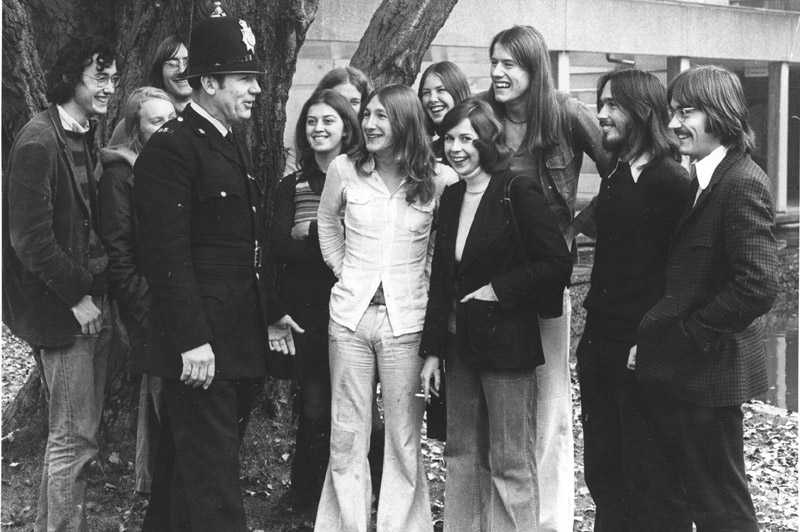(单词翻译:单击)
听力文本
Welcome to THE MAKING OF A NATION -- American history in VOA Special English. I'm Steve Ember. This week in our series, we look back at some of the social issues and cultural changes in America in the nineteen seventies and eighties. In some ways, the nineteen eighties seemed like the opposite of the nineteen sixties. The sixties were years of protest for social justice and change. Many Americans demonstrated against the Vietnam War. Blacks demonstrated for civil rights. Women demonstrated for equality. Many people welcomed new social programs created by the government.
By the nineteen eighties, however, many people seemed more concerned with themselves than with helping society. To them, success was measured mainly by how much money a person made. People wanted to live the good life, and that took money. The changes started to become evident during the nineteen seventies. For a while, these years brought a continuation of the social experiments and struggles of the sixties. But then people began to see signs of what society would be like in the eighties. There were a number of reasons for this change. One reason was the end to America's military involvement in Vietnam after years of war. Another was the progress of civil rights activists and the women's movement toward many of their goals. A third reason was the economy. During the nineteen seventies, the United States suffered a recession.
Interest rates and inflation were high. A shortage of imported oil as a result of tensions in the Middle East only added to the problems. As the nineteen seventies went on, many Americans became tired of economic struggle. They also became tired of social struggle. They had been working together for common interests. Now, many wanted to spend more time on their own interests. This change appeared in many parts of society. It affected popular culture, education and politics. "Lemme (Let me) hear your idea again." "OK, I want us to watch Jack Lemmon and a group of famous scientists discuss pollution and ecology on channel thirteen." "Good. And I wanna (want to) watch football highlights on channel two. Now guess what's gonna (going to) happen." One of the most popular television programs of that time was a comedy series that often dealt with politics and serious social issues. The show was called "All in the Family." The family was led by a factory worker named Archie Bunker. Carroll O'Connor played Archie, and Jean Stapleton played his wife, Edith. The Bunkers lived in a working-class neighborhood in the Queens borough of New York City.

Archie represented the struggles of the blue-collar working man against the social changes in America. He loved his country and was socially conservative -- in the extreme. "What about John Wayne? And before you say anything, lemme warn you –- when you're talking about 'The Duke,' you ain't just talking about an actor; you're talking about the spirit that made America great." "Are you kidding?" His opinions on subjects like race and women's equality were always good for an argument with his liberal daughter and even more liberal son-in-law. "Good. I can mail my letter today and it'll get to Washington by Monday." "Washington – Are you writing to Washington? "That's right. Michael wrote the president." "Write to the president, about what?" "All the things we've been talking about – the pollution of our air, the pollution of our water, the way us housewives have no protection from foods without nutrition, how they make products with harmful things in 'em. Like you saw what happened to Michael from that shirt."
"You, Michael Stivic, Meathead, you have the nerve to write to the president of the United States about your rash?" Edith would always try to make peace. "Maybe he knows a good skin man dermatologist." Another popular program, "Happy Days," about family life in the nineteen fifties, offered an escape from the social issues of the day. Music also changed. In the nineteen sixties, folk music was popular. Many of those folk songs were about social issues. But in the nineteen seventies, there was hard rock and punk. "Here is Wonder Mike, Hank, and Master G, The Sugarhill Gang." And in nineteen seventy-nine a group called the Sugarhill Gang brought rap music to national attention with a hit called "Rapper's Delight." In bookstores, the growing number of self-help books offered another sign of social change. These books advised people about ways to make themselves happier. One of the most popular self-help books was "I'm OK -- You're OK" by Doctor Thomas A. Harris. It was published in nineteen sixty-nine and led the way for many other popular psychology books throughout the seventies.
重点解析
1.be concerned with 关心;与……有关
Our government officials should be concerned with people's life.
我们的官员应该关注民生。
2.as a result of 由于……的结果;作为……的结果
She died as a result of her injuries.
她由于受伤而死亡。
3.be tired of 对……厌倦;对……厌烦
I know that you must be tired of this excuse.
我知道你一定厌烦了这个借口。
4.happen to 碰巧;偶然
I'd hate anything to happen to him.
但愿他平安无事。
参考译文
欢迎收听VOA慢速英语之建国史话节目,我是史蒂夫·恩伯。在本周的系列节目中,我们将回顾上世纪七八十年代美国的一些社会问题和文化变迁。在某些方面,20世纪80年代似乎与60年代相反。60年代是社会正义和变革的抗议年代,许多美国人示威反对越南战争。黑人为民权示威,妇女为平等而示威,许多人欢迎政府制定新的社会计划。
然而到了20世纪80年代,许多人似乎更关心自己而不是帮助社会。对他们来说,衡量成功的标准主要是一个人赚了多少钱。人们想要过上美好的生活,这需要钱。这种变化在20世纪70年代开始变得明显。一时间,这些年带来了60年代社会实验和斗争的延续。但后来人们开始看到80年代社会的迹象,这种变化有很多原因。一个原因是美国在多年战争后结束了对越南的军事介入,另一个原因是民权活动家和妇女运动朝着他们的许多目标取得的进展。第三个原因是经济,在20世纪70年代,美国遭受了经济衰退。
利率和通货膨胀都很高,中东紧张局势导致的进口石油短缺只会加剧问题。随着20世纪70年代的继续,许多美国人厌倦了经济斗争,他们也厌倦了社会斗争。他们一直为共同的利益而合作。现在,许多人想把更多的时间花在自己的兴趣上。这种变化出现在社会的许多方面,它影响了大众文化、教育和政治。“让我再听听你的想法。”“好的,我想我们一起来看看杰克·莱蒙和一群著名科学家在13频道讨论污染和生态问题。”“好的,我想看第二频道的足球精彩节目,猜猜会发生什么。”当时最受欢迎的电视节目之一是喜剧系列,经常涉及政治和严重的社会问题,节目叫《全家福》,这家的主人名叫阿奇·邦克,他是一位工厂工人,卡罗尔·奥康纳扮演阿奇,让·斯台普顿扮演他的妻子伊迪丝。邦克住在纽约市皇后区的一个工人阶级社区。
阿奇代表了蓝领工人与美国社会变革的斗争,他热爱自己的国家,在社会事务方面也非常保守。“约翰·韦恩呢?在你说话之前,我要警告你,当你谈论‘公爵’时,你不仅是在谈论一个演员;你是在谈论使美国伟大的精神。”“你开玩笑吧?”他在种族和女性平等等问题上的观点,总是有利于他与自由派女儿甚至更自由派女婿的争论。“很好,我今天可以把信寄出去,星期一就能送到华盛顿。”“华盛顿,你在给华盛顿写信吗?“没错,迈克尔给总统写了信。”“写信给总统,关于什么?”“我们一直在谈论的所有事情,空气污染、水污染、家庭主妇无法避免购买没有营养的食物,如何制造出含有有害物质的产品,就像你从那件衬衫上看到迈克尔的遭遇一样。”
“你,迈克尔·斯蒂维奇,笨家伙,你居然敢写信给美国总统说你的皮疹?”伊迪丝总是试图与人和平相处。“也许他认识一个皮肤科医生。”另一个受欢迎的节目《快乐的日子》,讲述的是20世纪50年代的家庭生活,使人们摆脱了当时的社会问题。音乐也改变了。在20世纪60年代,民间音乐很流行,许多民歌讲述的都是社会问题。但在20世纪70年代,出现了硬摇滚和朋克。“这是奇才麦克、汉克、大师G和糖山帮。”在1979年,一个名为糖山帮的乐队以一首名为《说唱歌手的喜悦》的流行歌曲引起了全国的关注在书店,越来越多的自助性书籍提供了社会变革的另一个迹象,这些书建议人们如何让自己更快乐。最受欢迎的一本自助书籍是托马斯·A·哈里斯医生撰写的《我很好,你也很好》。这本书出版于1969年,并在整个70年代引领了许多其他流行心理学书籍的发展。
译文为可可英语翻译,未经授权请勿转载!


